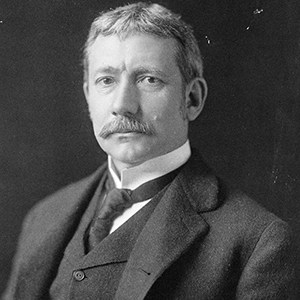Elihu Root served twice as the Secretary of War and once as the Secretary of State. Winner of the 1912 Nobel Peace Prize, Root is widely regarded as one of the most brilliant administrators in U.S. history.
Early Life
Root was born in New York in 1845. After graduating from New York University School of Law and obtaining admission to the bar, Root developed a very successful private law practice through which he advised banks, railroads, and other prominent businesses. Although Root had no prior public service or military experience, President William McKinley asked him to serve as his Secretary of War.
Service as Secretary of War
Root accepted the position to represent “the greatest of all our clients, the government of our country.” In his post, Root modernized the War Department. He created the War College, expanded West Point, strengthened oversight over the National Guard, and solidified the overall structure of the department. Root also helped reshape U.S. policy regarding its colonies, favoring an approach that protected local customs and preserved a level of self-determination. Henry L. Stimson, who later served as secretary of war, stated that “no such intelligent, constructive, and vital force” had ever held the position in U.S. history.
Service as Secretary of State
In 1905, President Theodore Roosevelt asked Root to serve as Secretary of State following the death of John Hay. Upon assuming the position, he traveled to South America to smooth relations with both Cuba and Columbia. In 1907, he also successfully arbitrated a dispute between France and Germany over interests in Morocco. Roots’ other significant accomplishments as Secretary of State included eliminating patronage from the Foreign Service and Consular Service by implementing the first Foreign Service Exam. He also reshaped the State Department by creating a system of rotating diplomatic service members to diversify their experience and structuring the agency into geographic regions.
Later Life
Root later served in the U.S. Senate from 1909 to 1915. Upon returning to private practice, he continued to play a prominent role in establishing international arbitration, including the Central American Court of Justice and the International Court of Justice.









